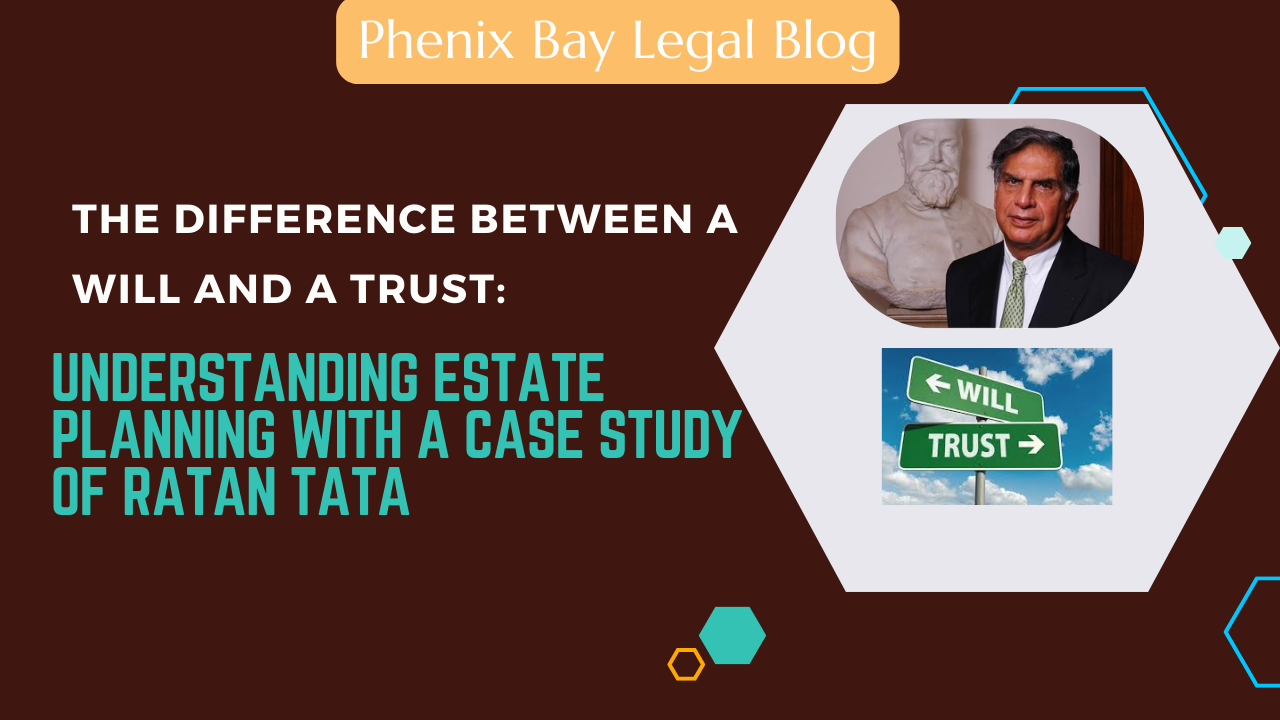
The Difference Between a Will and a Trust: Understanding Estate Planning with a Case Study of Ratan Tata
Estate planning is crucial for everyone, regardless of their wealth or social status. Two of the most common tools in estate planning are wills and trusts, and while they share some similarities, they serve distinct purposes and offer different benefits. Understanding the difference between a will and a trust is essential for making the best decisions regarding the future of your estate and your loved ones.
The Difference Between a Will and a Trust: Understanding Estate Planning with a Case Study of Ratan Tata
Introduction: Understanding Wills and Trusts Under Indian Law
Estate planning is a crucial part of securing your legacy and ensuring that your wealth is distributed according to your wishes. In India, the legal framework governing wills and trusts is primarily defined by the Indian Succession Act, 1925 , and the Indian Trusts Act, 1882. These laws provide clear guidelines for how assets are passed on to beneficiaries, whether through a will or a trust, and outline the rights and duties of individuals involved in the estate planning process.
While wills are essential for directing the distribution of assets after death, trusts offer a more flexible and efficient alternative for managing wealth, avoiding probate, and safeguarding privacy. For high-net-worth individuals, such as Ratan Tata, who was a prominent Indian industrialist from the Parsi community, understanding the differences between these two tools is critical. Tata, who remained unmarried and childless, would have relied on comprehensive estate planning to ensure that his assets were distributed according to his wishes, rather than following the rules of intestate succession laid out in the Indian Succession Act.
In this article, we explore the key differences between wills and trusts, with a particular focus on how these instruments operate under Indian law, and how they can be used for effective estate planning. We will also discuss Ratan Tata’s case as a real-world example of how wealthy individuals can use these tools to manage their estates. By the end, you'll have a deeper understanding of how both wills and trusts work, and how they can be combined to create a robust estate plan that minimizes legal complications, reduces taxes, and ensures your legacy is protected.
Estate planning is crucial for everyone, regardless of their wealth or social status. Two of the most common tools in estate planning are wills and trusts, and while they share some similarities, they serve distinct purposes and offer different benefits. Understanding the difference between a will and a trust is essential for making the best decisions regarding the future of your estate and your loved ones.In this comprehensive guide, we will explore the key differences between wills and trusts, the pros and cons of each, and dive into a real-world case study of Ratan Tata, one of India's most prominent industrialists. Tata’s personal life, characterized by his decision to remain unmarried and childless, offers a unique lens through which to view the importance of thoughtful estate and succession planning.
What is a Will?
A will, often called a last will and testament, is a legal document that expresses how a person's assets should be distributed after their death. It can address everything from financial assets to personal possessions, and even designate guardians for minor children. Importantly, a will goes through probate, a court-supervised process where the legal validity of the will is confirmed and the executor of the will is given the authority to distribute the assets as specified.
Key Components of a Will:
- Testator: The person who creates the will.
- Executor: The person chosen by the testator to carry out the will's instructions.
- Beneficiaries: The individuals or organizations who will receive the assets from the estate.
- Guardianship: If the testator has minor children, they can appoint a guardian to care for them.
One of the most significant aspects of a will is its role in providing clarity. For example, it can prevent disputes among family members about how assets should be divided. However, wills also have some limitations.
Advantages of a Will:
- Simple and straightforward: Wills are generally easier and cheaper to create compared to trusts.
- Guardianship: You can designate guardians for minor children in your will, which is something you cannot do with a trust.
- Flexibility: You can specify the distribution of almost any type of property, including personal items and financial assets.
Disadvantages of a Will:
- Probate: Wills must go through probate, which can be a lengthy and expensive process, depending on the complexity of the estate.
- Public Record: After death, a will becomes a public document, which means anyone can access it. This can potentially lead to family disputes or unwanted attention.
- Limited Control Over Asset Distribution: Once assets are distributed, you have no further control over how beneficiaries use them.
What is a Trust?
A trust is a legal entity created to hold and manage assets on behalf of a beneficiary. The person who creates the trust is called the grantor or settlor, and the individual or institution managing the trust is the trustee. There are several types of trusts, but the two most common types are revocable trusts and irrevocable trusts.
Revocable Trust:
A revocable trust, also known as a living trust, can be changed or revoked by the grantor at any time during their life. This type of trust offers flexibility and control, as the grantor can modify the terms, add or remove assets, or even terminate the trust if their circumstances change. Upon the grantor’s death, the assets are distributed to beneficiaries according to the terms of the trust, bypassing probate entirely.
Irrevocable Trust:
An irrevocable trust cannot be altered or revoked once it is established. The assets placed in an irrevocable trust are permanently removed from the grantor’s estate, which can offer significant tax benefits and protection from creditors. Irrevocable trusts are often used in more complex estate planning situations, such as when the grantor wants to reduce estate taxes or protect assets from lawsuits.
Advantages of a Trust:
- Avoids Probate: One of the most significant benefits of a trust is that it bypasses probate, meaning that assets can be distributed quickly and privately after death.
- Greater Control: Trusts allow the grantor to specify how and when assets are distributed, offering greater control than a will. For example, you could set up a trust to provide funds to beneficiaries over time rather than in a lump sum.
- Privacy: Unlike a will, which becomes public record, a trust remains private. This can be especially important for individuals who want to keep their estate details confidential.
- Tax Benefits: Certain types of trusts, particularly irrevocable trusts, can help reduce estate taxes, which is a significant consideration for high-net-worth individuals.
Disadvantages of a Trust:
- Cost: Setting up a trust is generally more expensive and complicated than drafting a will. There are also ongoing management fees, particularly if a professional trustee is involved.
- No Guardianship: Trusts cannot appoint guardians for minor children, so they are typically used in conjunction with a will.
- Ongoing Management: Trusts require ongoing administration, which can be burdensome for some individuals, especially if the trust is complicated.
Key Differences Between a Will and a Trust
|
Aspect |
Will |
Trust |
|
|
|
|
|
Probate |
Must go through probate, which can be time-consuming |
Avoids probate, allowing for faster asset distribution |
|
Control Over Distribution |
Limited to asset division at death |
Allows for control over how and when assets are distributed |
|
Privacy |
Becomes public record after death |
Remains private |
|
Cost |
Less expensive to create |
More expensive and complex |
|
Guardianship |
Can appoint guardians for minor children |
Cannot appoint guardians |
|
|
Tax Planning |
Offers minimal estate tax benefits |
Can provide significant tax advantages |
Why You Need Both a Will and a Trust
For most individuals, the best estate plan includes both a will and a trust. Each serves a different purpose, and together, they offer comprehensive protection for your assets and your loved ones.
When to Use a Will:
- If you have minor children, a will allows you to appoint guardians for them.
- A will is also essential for specifying personal wishes, such as funeral arrangements or distributing personal property that may not be covered by a trust.
When to Use a Trust:
- If you want to avoid probate, a trust is essential. Trusts allow for quicker, more private asset distribution.
- If you want to maintain control over how and when your beneficiaries receive their inheritance, a trust is the better choice. You can create specific conditions or a schedule for distribution.
- Trusts are also beneficial if you have a large estate, as they can help reduce estate taxes and protect your assets from creditors.
Tax Implications: Will vs. Trust
One of the primary motivations for setting up a trust, particularly an irrevocable trust, is the potential to reduce estate taxes. This is especially relevant for high-net-worth individuals like Ratan Tata, whose estate could be subject to significant taxation if not properly managed.
Estate Taxes with a Will:
- Assets distributed via a will are subject to estate taxes. Depending on the size of the estate and the applicable laws, these taxes can be substantial.
- In many jurisdictions, probate fees are also applied, further diminishing the value of the estate.
Estate Taxes with a Trust:
- Trusts, especially irrevocable ones, allow for more effective estate tax planning. By transferring assets to a trust during your lifetime, you can reduce the size of your taxable estate.
- Additionally, trusts can be structured to provide ongoing tax advantages for beneficiaries, particularly in cases where the trust generates income over time.
Case Study: Ratan Tata and Succession Planning in the Context of Parsi Law
Ratan Tata, one of India's most influential industrialists, is known for his contributions to business and philanthropy. As a Parsi, Tata’s succession planning would fall under the provisions of the Indian Succession Act, 1925, specifically those governing Parsis. His unique personal circumstances—remaining unmarried and childless—make his estate planning particularly intriguing and important.
Ratan Tata’s Estate and Succession Under Parsi Law
Since Tata has no children or spouse, his estate would follow the Parsi intestate succession rules if he were to pass away without a will or trust in place. Under the Indian Succession Act, Parsis have a specific order of inheritance for cases of intestacy (dying without a will):
- If there are no lineal descendants (children or grandchildren), the deceased's assets are divided among the parents, siblings, and close relatives.
- For example, if Ratan Tata passes without a will, his assets would likely be distributed among his siblings (or their descendants, such as nephews or nieces) and surviving parents (if alive).
Given his high-profile and large estate, relying on intestate succession could lead to complex legal disputes among distant relatives and potential delays in distributing his assets. This is why individuals like Tata, who do not have immediate heirs, often opt for wills and trusts to ensure their assets are distributed according to their wishes.
Why a Will is Important for Parsi Estate Planning
A will allows Tata to specify exactly how he wants his wealth distributed, especially important considering his status and the potential for distant relatives to contest his estate under intestate succession laws. For Parsi individuals, the Indian Succession Act mandates that a probate is required for the will to take effect. This means that the will must go through a legal process in which the court validates its authenticity and grants authority to the executor to distribute the assets.
Without a valid will, Tata's estate could be subject to lengthy probate disputes, delaying the distribution of assets. Given the size of his estate, this could also attract unwanted attention or challenges from parties seeking a portion of his wealth.
How a Trust Would Benefit Ratan Tata’s Estate
By setting up a trust, Tata could bypass the probate process altogether, avoiding the potential legal delays and maintaining privacy regarding his estate. Trusts allow assets to be distributed according to Tata's instructions, without public scrutiny and in a more efficient manner.
For someone of Tata's stature, who has been heavily involved in philanthropy, a public charitable trust would also be a powerful tool. Many of Tata’s philanthropic initiatives could continue seamlessly through such a trust after his passing. Under the Indian Trusts Act, 1882, Tata could establish a charitable trust to ensure that his wealth supports the causes he cares about—like education, healthcare, and social welfare.
Charitable trusts in India enjoy significant tax benefits under the Income Tax Act, 1961, further encouraging the use of such structures by wealthy individuals. In Tata's case, a charitable trust could preserve his legacy by contributing to social causes long after his death, without the complications of probate.
The Importance of Wills and Trusts for Parsis
For Parsi individuals like Ratan Tata, both wills and trusts serve crucial roles in estate planning:
- Wills allow individuals to designate their heirs and ensure that their assets are distributed according to their wishes. However, for Parsis, the will must go through probate, which can be time-consuming.
- Trusts offer a way to avoid probate entirely, ensuring that assets are distributed quickly and privately. This is especially valuable for individuals who want to control how their estate is managed after death.
A charitable trust, in particular, could help Tata preserve his legacy of philanthropy, while a private trust could ensure that his wealth is managed according to his wishes.
Why Parsis Should Consider Both Wills and Trusts
The case of Ratan Tata highlights the importance of comprehensive estate planning, particularly for high-net-worth individuals. While Tata’s personal circumstances—remaining unmarried and childless—are unique, his situation underscores the need for both wills and trusts to manage large estates effectively.For Parsis, the Indian Succession Act provides clear guidelines for intestate succession, but relying solely on these rules can lead to complications and delays. By using a combination of a will and a trust, individuals can ensure that their estate is distributed according to their desires while avoiding the pitfalls of probate and legal disputes.
Conclusion:
The Importance of Comprehensive Estate Planning.Whether you're an average individual or a global business leader like Ratan Tata, estate planning is essential to ensure that your assets are distributed according to your wishes. The choice between a will and a trust depends on your specific circumstances, but in many cases, the best approach involves using both tools to create a well-rounded estate plan.
At Phenix Bay Legal, we are here to help you navigate the complexities of estate planning. Our team of experts specializes in crafting customized estate plans that protect your assets, minimize taxes, and provide peace of mind. Whether you're looking to create a simple will or a comprehensive trust, we are here to guide you every step of the way. Contact us today to learn more about how we can help you secure your legacy.
Get access to all Formats via Subscription
Mini Drafting Course on Civil Criminal and Contract Act
------------------------------------------------------------------------------------------------------------------------------------------------------
Keywords:
- Estate planning
- Difference between a will and a trust
- Will vs trust
- Ratan Tata estate planning
- Probate and estate distribution
- Avoiding probate with a trust
- Trust tax benefits
- Succession planning
#EstatePlanning
#WillsAndTrusts
#IndianSuccessionAct
#IndianTrustsAct
#RatanTataLegacy
#SuccessionPlanning
#TrustsVsWills
#ProbateLaw
#WealthManagementIndia
#LegalAdvice
#ParsiSuccession
#InheritanceLaw
#AssetProtection
#PhenixBayLegal
#TaxPlanningIndia
#CharitableTrusts
#HighNetWorthEstate
#LawAndFinance
#TrustFundIndia
#IndianLegalSystem
More >>

Jyoti Sharma vs. Vishnu Goyal & Anr. 2025 INSC 1099
This was a long running legal battle between a landlord and her tenants over a shop. The landlord, Jyoti Sharma, wanted her shop back for two main reasons: The tenants had stopped paying rent. She needed the shop to expand her family's business (her bonafide need).
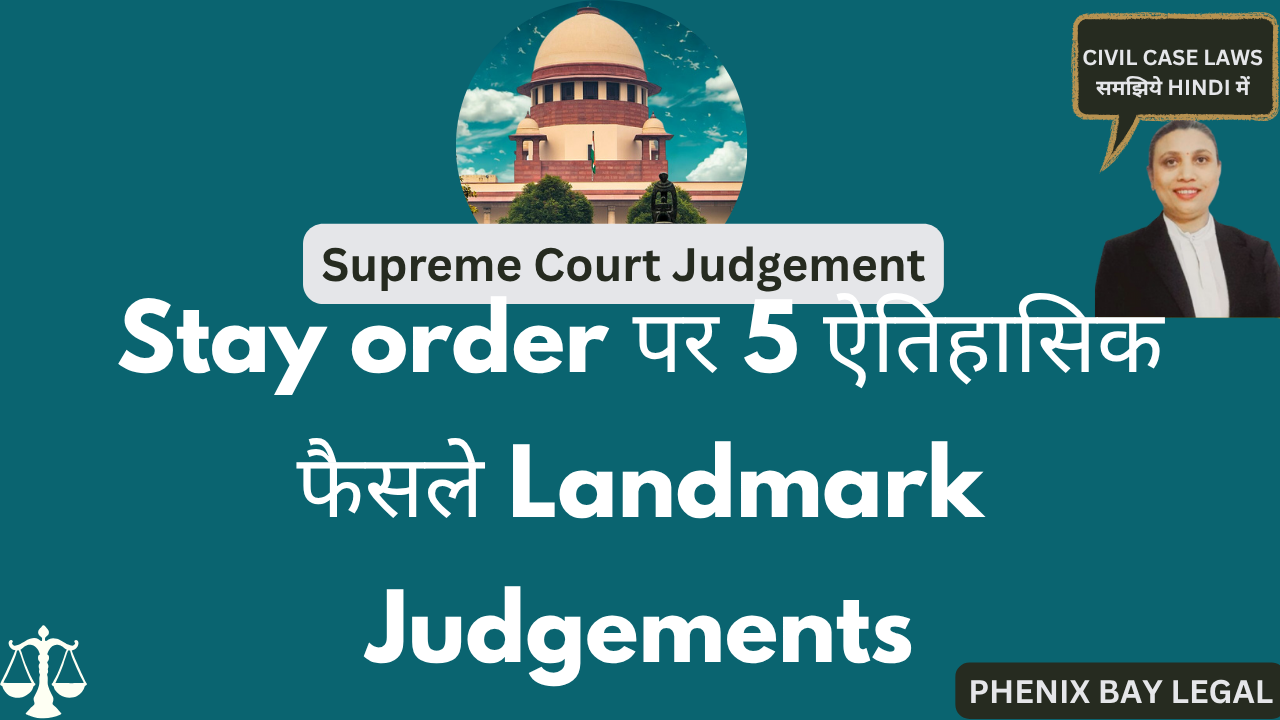
Landmark Judgement on Injunction
In civil, commercial, or even family disputes. But when is a simple injunction suit enough? When do you need to add a declaration of title? And how do courts balance urgency vs evidence in interim relief?
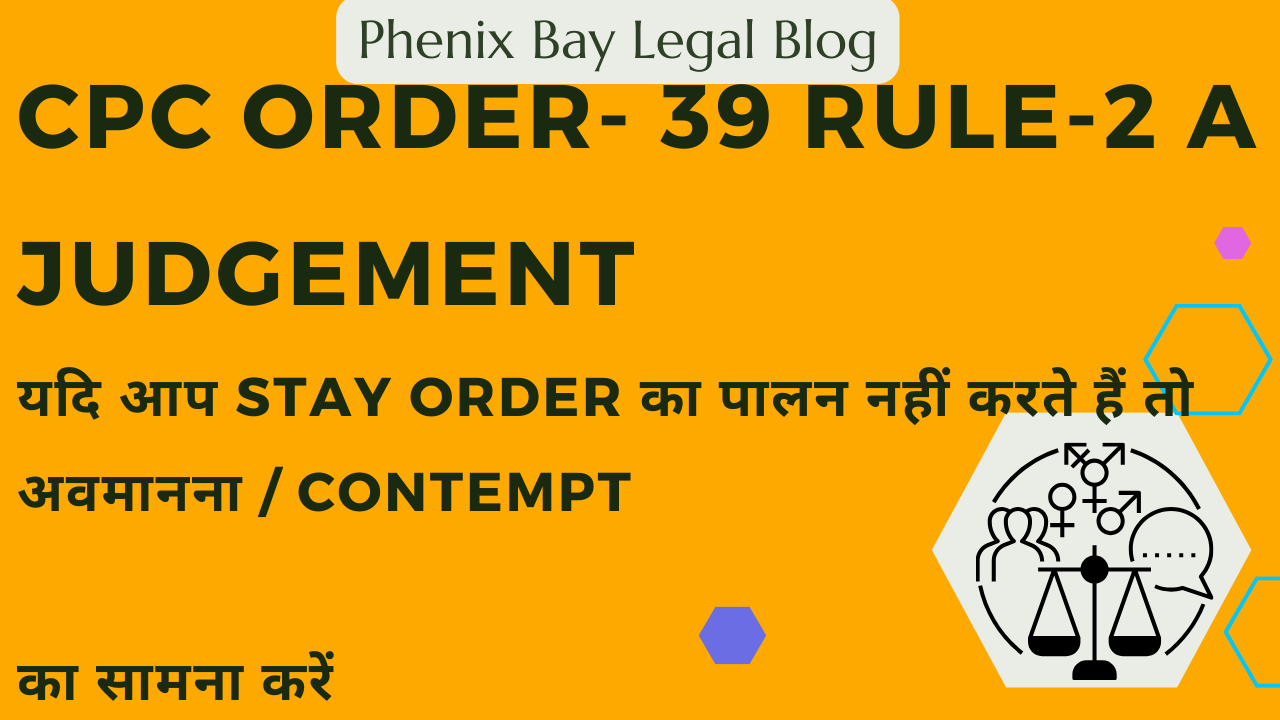
Case Analysis: Stay Order Violation and Contempt of Court by Supreme Court of India
Giving an undertaking to the court is equivalent to an order of injunction—any violation invites contempt proceedings.Injunction orders remain valid until formally vacated by a court—violation before vacation can lead to punishment.
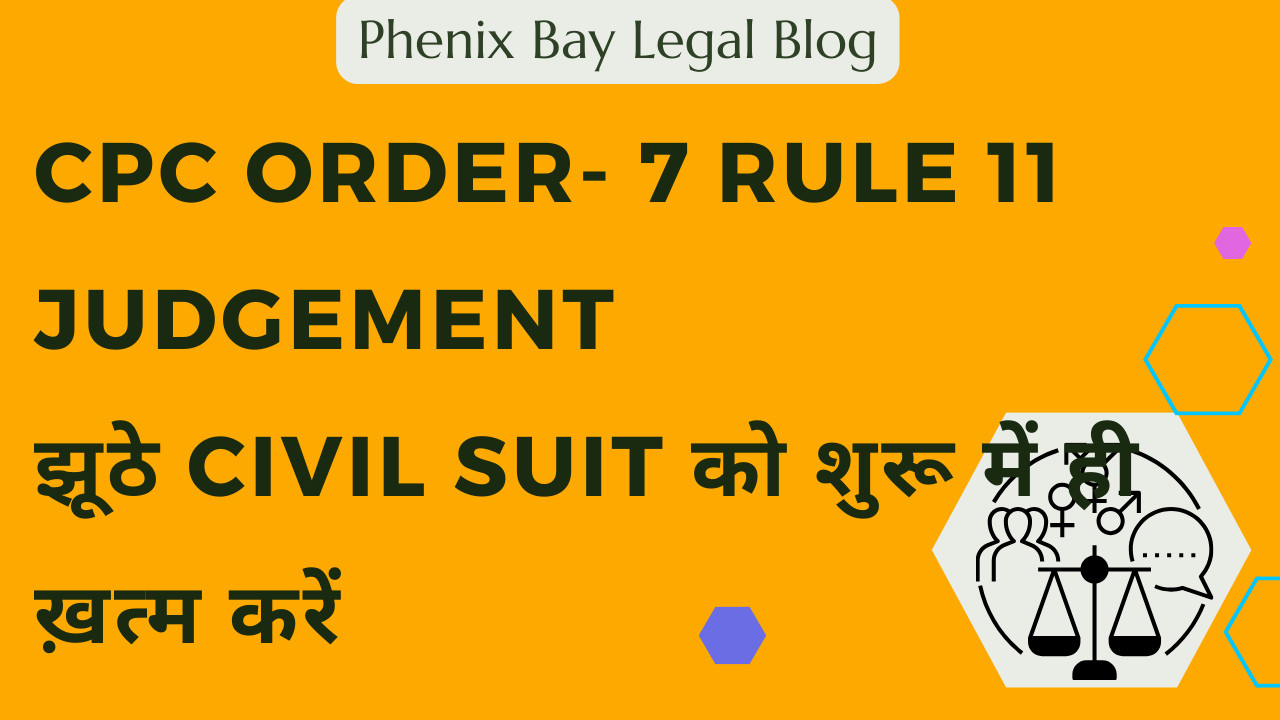
Order 7 Rule 11 of CPC Explanation in Land Mark Judgement
The Sopan Sukhdeo Sable judgment is a landmark ruling that reinforces Order 7 Rule 11 of CPC as a safeguard against frivolous and legally untenable claims. It highlights the importance of examining only the plaint’s contents to decide whether a suit should be dismissed at the threshold.
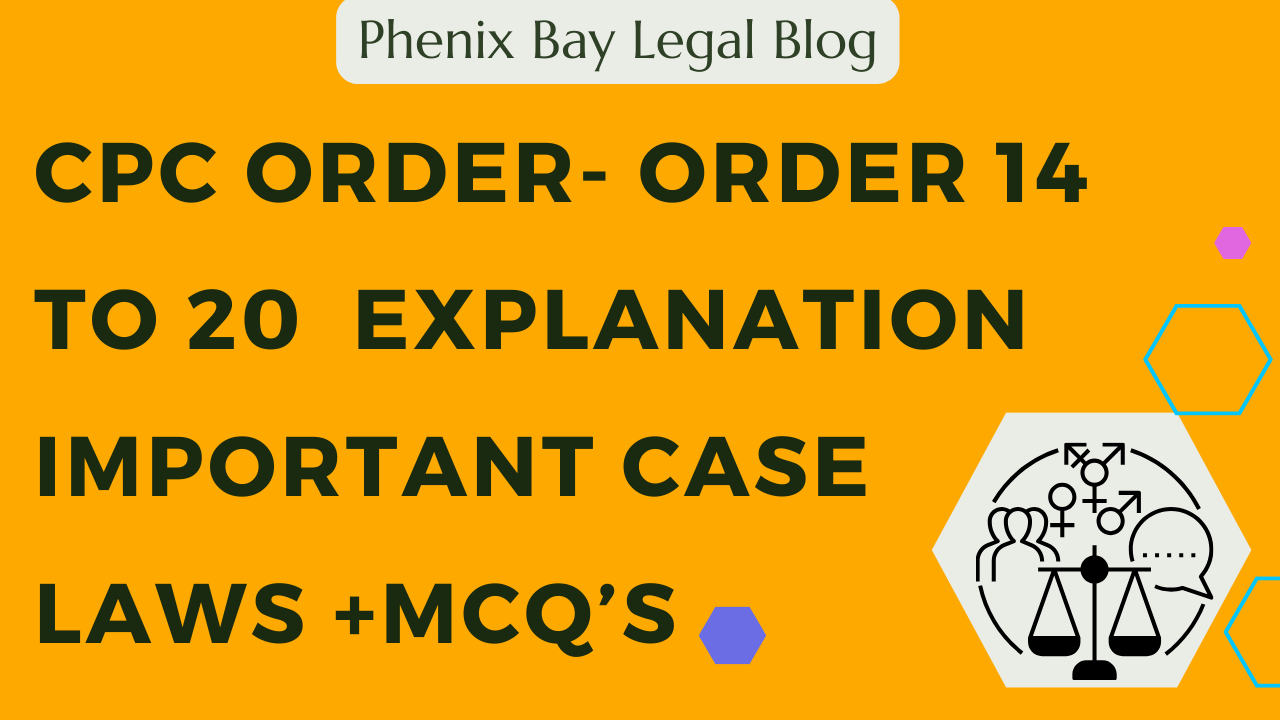
CPC Order- Order 14 to 20 Explanation IMPORTANT CASE LAWS +MCQ’S for Judiciary Exam Preparation
CPC Order- Order 14 to 20 Explanation IMPORTANT CASE LAWS +MCQ’S for Judiciary Exam Preparation
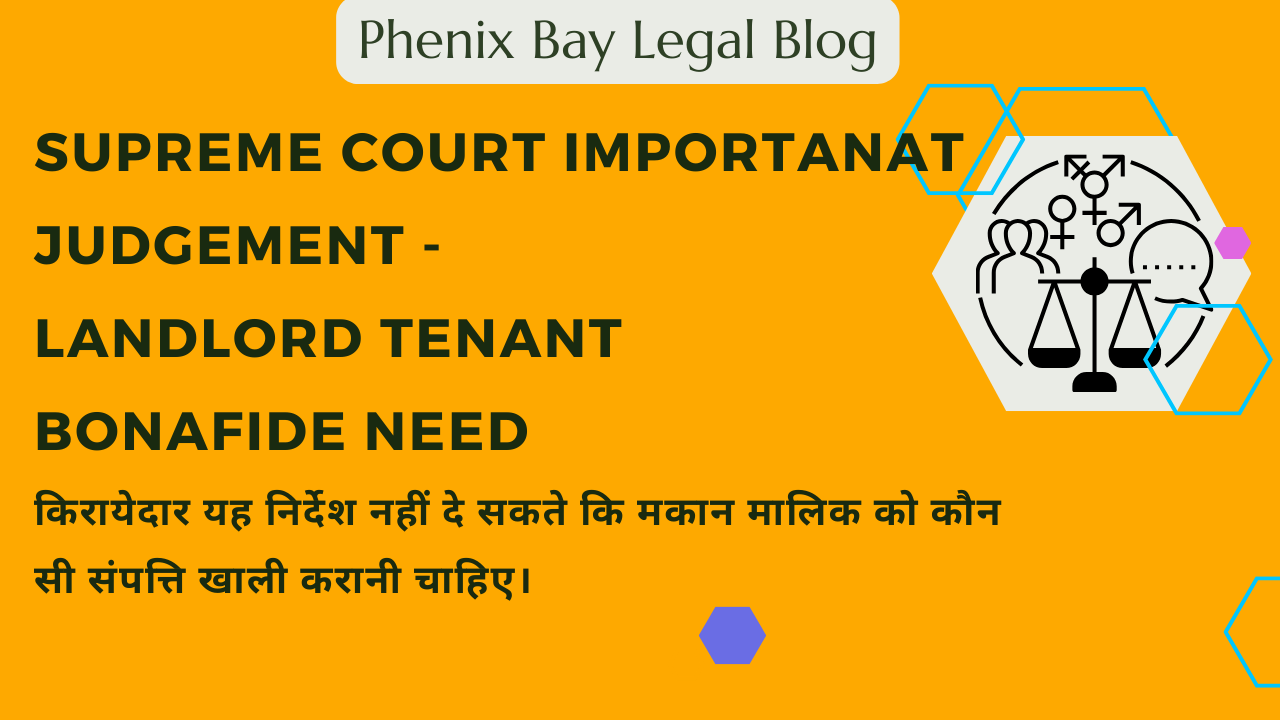
Supreme Court ImportanatJudgement - Landlord Tenant Bonafide need
This case involves a dispute over eviction of a tenant based on the bona fide need of the landlord. The Supreme Court ruled in favor of the landlord, reversing the High Court's decision. Below is a detailed breakdown of the judgment with relevant legal principles, precedents, and reasoning.